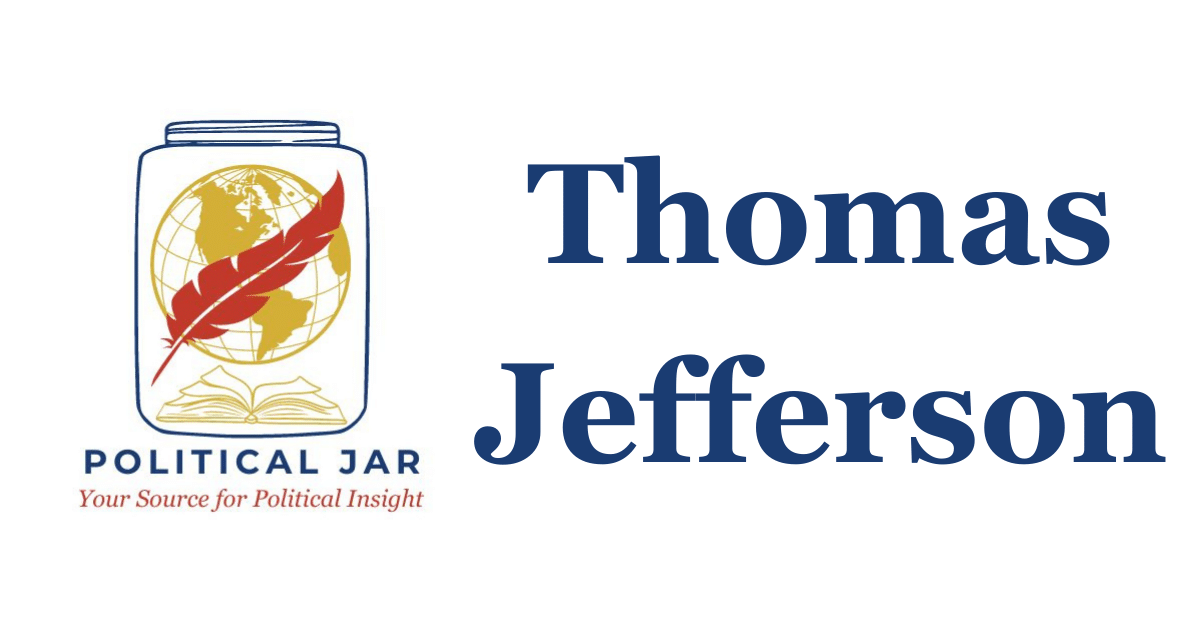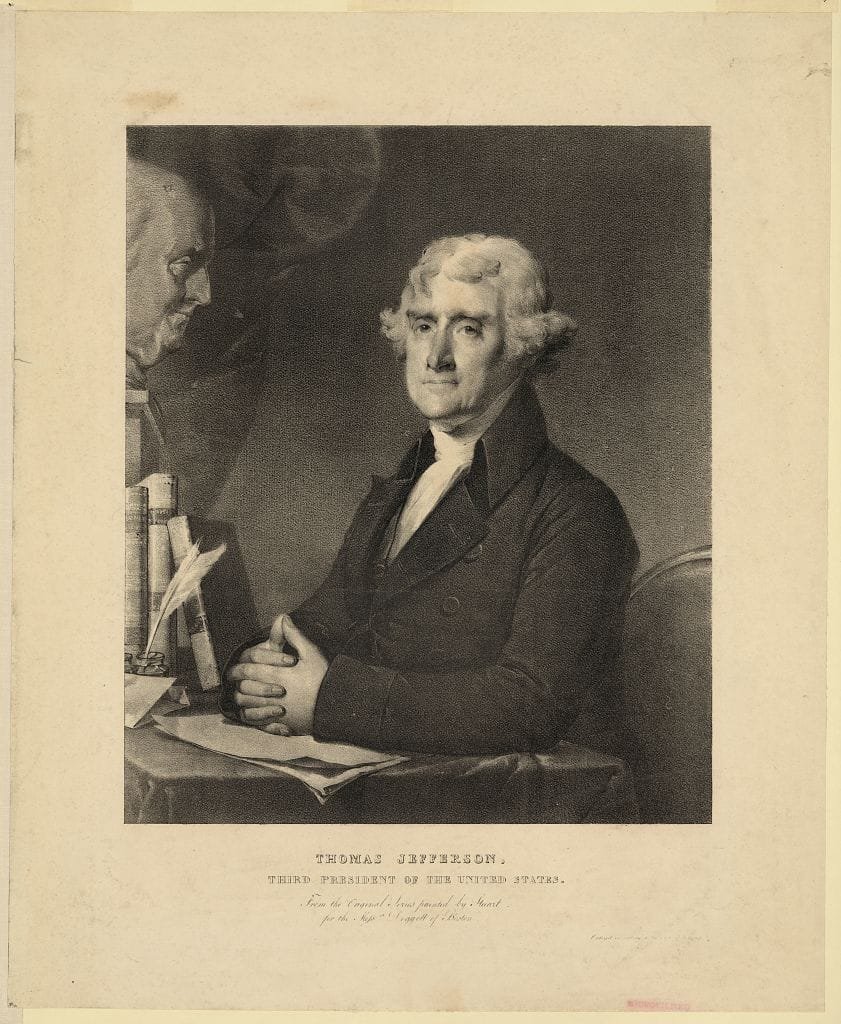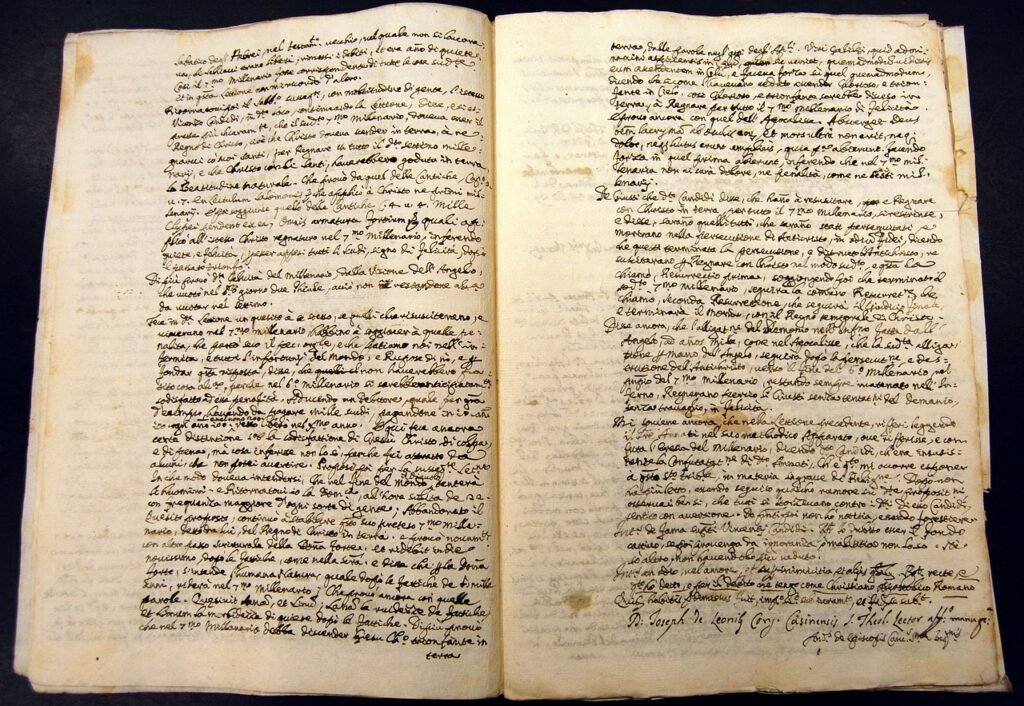




Thomas Jefferson
Thomas Jefferson, the third President of the United States, was a polymath whose influence on the early Republic was profound. Known as the principal author of the Declaration of Independence, Jefferson’s legacy encompasses his roles as a statesman, diplomat, philosopher, and architect. His contributions to the fledgling nation helped shape its democratic ideals and institutions. This biography delves into the life and accomplishments of Thomas Jefferson, exploring his impact on American history.
Early Life and Education
Birth and Family Background
Thomas Jefferson was born on April 13, 1743, at Shadwell plantation in the Virginia colony. He was the third of ten children born to Peter Jefferson, a planter and surveyor, and Jane Randolph Jefferson, who hailed from one of Virginia’s most distinguished families (Meacham, 2012). The Jefferson family was well-respected, and their social standing provided young Thomas with opportunities for education and advancement.
Education and Early Influences
Jefferson began his formal education at the age of five, studying at a local school before being tutored by the Reverend William Douglas. His studies included classical languages, mathematics, and science. At the age of nine, Jefferson was sent to a boarding school run by Reverend James Maury, where he furthered his classical education and developed a lifelong love for learning (Ellis, 1997).
In 1760, Jefferson entered the College of William & Mary in Williamsburg, Virginia. There, he studied under Professor William Small, who introduced him to the ideas of the Enlightenment and the importance of scientific inquiry and rational thought. Jefferson’s education at William & Mary was formative, fostering his intellectual curiosity and shaping his future political philosophy (Gordon-Reed, 2008).
Early Career and Legal Training
After graduating from college in 1762, Jefferson studied law under the guidance of George Wythe, one of the most prominent legal minds in Virginia. Wythe’s mentorship was instrumental in Jefferson’s development as a lawyer and thinker. He was admitted to the Virginia bar in 1767 and began a successful legal practice, representing clients in a variety of cases and gaining a reputation for his eloquence and legal acumen (Meacham, 2012).
Entry into Politics
Early Political Career
Jefferson’s entry into politics began with his election to the Virginia House of Burgesses in 1769. As a member of the colonial legislature, he quickly became known for his eloquent speeches and strong advocacy for colonial rights. Jefferson’s political philosophy was heavily influenced by the Enlightenment ideals of liberty, equality, and self-governance (Ellis, 1997).
Drafting the Declaration of Independence
Jefferson’s political career took a significant turn in 1775 when he was appointed as a delegate to the Second Continental Congress. His most enduring contribution during this period was his role in drafting the Declaration of Independence. Drawing on the works of Enlightenment thinkers such as John Locke, Jefferson articulated the colonies’ grievances against King George III and asserted the fundamental rights of life, liberty, and the pursuit of happiness (Gordon-Reed, 2008). The Declaration, adopted on July 4, 1776, remains one of the most iconic documents in American history.
Governor of Virginia
Challenges and Accomplishments
In 1779, Jefferson was elected as the Governor of Virginia. His tenure as governor was marked by significant challenges, including the British invasion of Virginia during the Revolutionary War. Despite these difficulties, Jefferson worked to modernize Virginia’s legal system and promote education. He authored the Virginia Statute for Religious Freedom, which established the principle of separation of church and state and influenced the First Amendment to the U.S. Constitution (Meacham, 2012).
Retirement and Personal Pursuits
After his term as governor, Jefferson retired to Monticello, his plantation in Virginia. During this period, he focused on his personal interests, including architecture, agriculture, and scientific experimentation. Monticello, designed by Jefferson himself, reflected his architectural genius and remains a testament to his creativity and vision (Ellis, 1997).
Diplomatic Service and Secretary of State
Minister to France
In 1784, Jefferson was appointed as Minister to France, succeeding Benjamin Franklin. His diplomatic mission was to strengthen Franco-American relations and secure economic and political support for the young Republic. During his five-year tenure in Paris, Jefferson immersed himself in French culture and politics, forging important alliances and gaining valuable insights into European affairs (Gordon-Reed, 2008).
Return to the United States and Appointment as Secretary of State
Jefferson returned to the United States in 1789, and President George Washington appointed him as the first Secretary of State. In this role, Jefferson was responsible for foreign affairs and played a crucial part in shaping the nation’s foreign policy. His tenure was marked by significant accomplishments, including the negotiation of treaties and efforts to maintain neutrality during European conflicts (Meacham, 2012).
Vice Presidency and the Election of 1800
Vice President under John Adams
In the election of 1796, Jefferson ran as the Democratic-Republican candidate for President but lost to John Adams. Under the electoral system in place at the time, the candidate with the second-highest number of votes became Vice President. As Vice President, Jefferson found himself at odds with Adams and the Federalist Party, particularly over issues such as the Alien and Sedition Acts, which he vehemently opposed (Ellis, 1997).
The Election of 1800
The election of 1800 was one of the most contentious in American history. Jefferson ran against Adams in a bitterly fought campaign that highlighted the deep political divisions in the country. The election ultimately resulted in a tie between Jefferson and his running mate, Aaron Burr, leading to a prolonged and contentious decision in the House of Representatives. Jefferson emerged victorious, marking the first peaceful transfer of power between political parties in U.S. history (Gordon-Reed, 2008).
Presidency
Domestic Policies
As President, Jefferson sought to implement his vision of a limited federal government and an agrarian-based economy. He pursued policies aimed at reducing the national debt, cutting taxes, and downsizing the military. One of his most significant domestic achievements was the repeal of the Alien and Sedition Acts, which he viewed as violations of civil liberties (Meacham, 2012).
The Louisiana Purchase
One of the most significant achievements of Jefferson’s presidency was the Louisiana Purchase in 1803. The acquisition of this vast territory from France doubled the size of the United States and secured control of the Mississippi River and the port of New Orleans. The purchase, negotiated for $15 million, was a monumental achievement that had a lasting impact on the nation’s expansion and development (Ellis, 1997).
Lewis and Clark Expedition
To explore the newly acquired western territories, Jefferson commissioned the Lewis and Clark Expedition. Led by Meriwether Lewis and William Clark, the expedition set out in 1804 to map the land, establish trade with Native American tribes, and gather scientific information about the region. The successful journey provided valuable knowledge about the western frontier and paved the way for future exploration and settlement (Gordon-Reed, 2008).
Second Term and Foreign Policy Challenges
Jefferson’s second term was marked by increasing foreign policy challenges, particularly with Britain and France. Both nations were engaged in the Napoleonic Wars and sought to restrict American trade with their adversaries. In response, Jefferson implemented the Embargo Act of 1807, which aimed to pressure Britain and France by prohibiting American ships from trading with foreign ports. The embargo, however, proved economically disastrous for the United States and was highly unpopular (Meacham, 2012).
Later Years and Legacy
Retirement and Return to Monticello
After serving two terms as President, Jefferson retired to Monticello in 1809. He continued to be active in public life, corresponding with political leaders and advocating for education and public service. During his retirement, Jefferson founded the University of Virginia, an institution he envisioned as a beacon of learning and enlightenment. He designed the campus, selected the faculty, and outlined the curriculum, leaving a lasting legacy in American higher education (Ellis, 1997).
Personal Life and Family
Jefferson’s personal life was marked by both accomplishments and controversies. He married Martha Wayles Skelton in 1772, and the couple had six children, though only two survived to adulthood. Martha’s death in 1782 profoundly affected Jefferson, and he never remarried (Gordon-Reed, 2008).
Jefferson’s relationship with Sally Hemings, an enslaved woman at Monticello, has been the subject of significant historical scrutiny. Evidence suggests that Jefferson fathered several children with Hemings, a fact that has complicated his legacy as a champion of liberty and human rights (Meacham, 2012).
Death and Enduring Legacy
Thomas Jefferson died on July 4, 1826, the 50th anniversary of the Declaration of Independence, just hours before his friend and fellow founding father, John Adams. Jefferson’s death marked the end of an era, but his influence on American history endures.
Contributions to American Ideals and Institutions
Jefferson’s contributions to American ideals and institutions are profound. As the principal author of the Declaration of Independence, he articulated the nation’s core principles of liberty, equality, and self-governance. His advocacy for religious freedom, as enshrined in the Virginia Statute for Religious Freedom, influenced the First Amendment to the Constitution (Ellis, 1997).
Architect of American Expansion
Jefferson’s vision for American expansion and exploration had a lasting impact on the nation’s development. The Louisiana Purchase and the Lewis and Clark Expedition set the stage for westward expansion, shaping the United States’ growth and its emergence as a continental power (Gordon-Reed, 2008).
Educational Legacy
Jefferson’s commitment to education and knowledge is perhaps best exemplified by his founding of the University of Virginia. His belief in the importance of education for a functioning republic has left an enduring legacy in American higher education, influencing generations of scholars and leaders (Meacham, 2012).
Complex Legacy and Historical Scrutiny
Jefferson’s legacy is complex and multifaceted. While he is celebrated for his contributions to American democracy and his intellectual achievements, his ownership of slaves and his relationship with Sally Hemings present significant contradictions. Historians continue to grapple with these complexities, striving to present a nuanced understanding of Jefferson’s life and impact (Gordon-Reed, 2008).
Final Summary
Thomas Jefferson’s life and legacy are a testament to his profound impact on the United States. From his early days as a lawyer and statesman to his presidency and later years, Jefferson’s contributions to American ideals, governance, and expansion are unparalleled. His commitment to liberty, education, and the principles of the Enlightenment helped shape the nation’s identity and continue to influence its trajectory. As a founding father, diplomat, and leader, Thomas Jefferson’s story is an essential part of the American historical narrative.
References
Ellis, J. J. (1997). American Sphinx: The Character of Thomas Jefferson. New York, NY: Alfred A. Knopf.
Gordon-Reed, A. (2008). The Hemingses of Monticello: An American Family. New York, NY: W.W. Norton & Company.
Meacham, J. (2012). Thomas Jefferson: The Art of Power. New York, NY: Random House.
